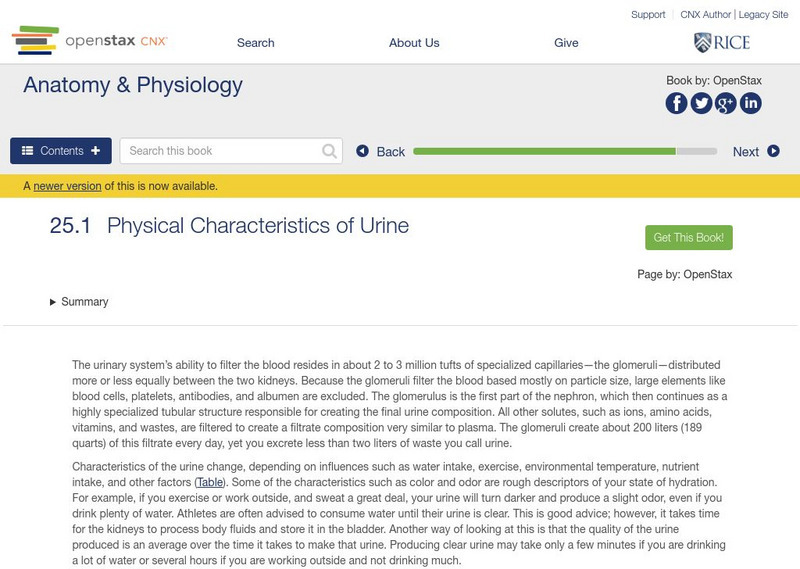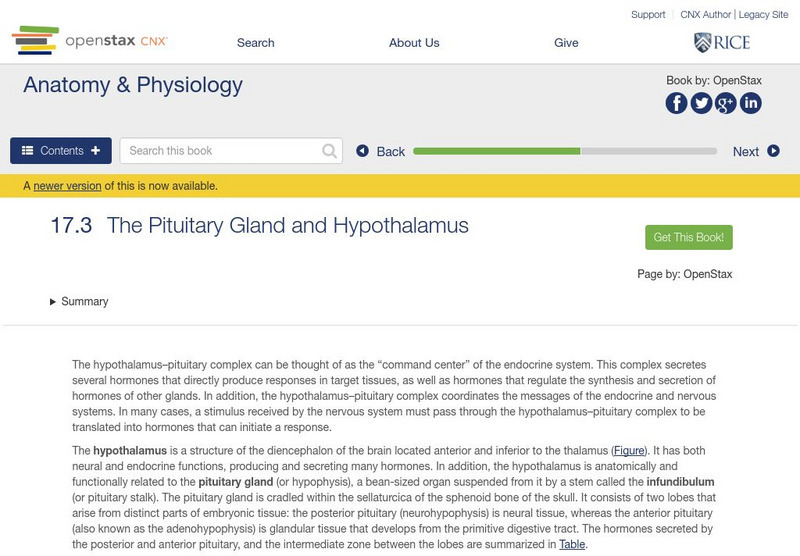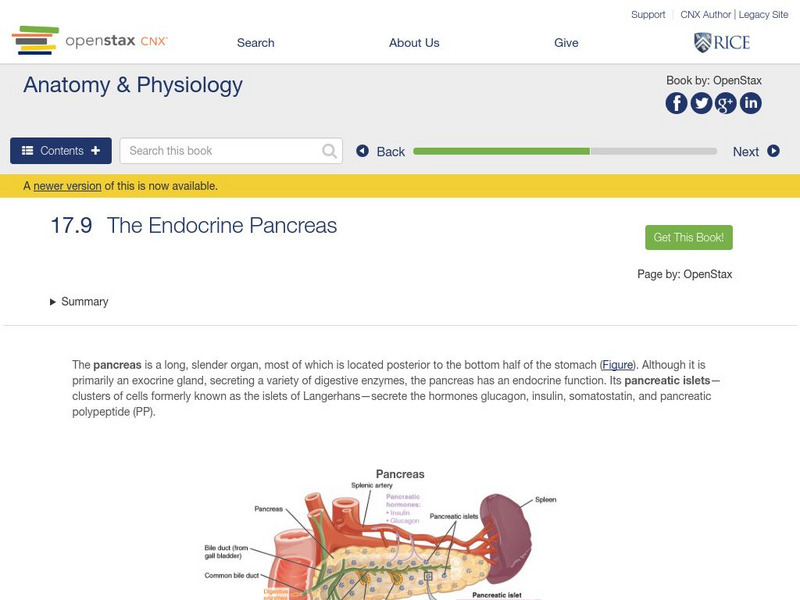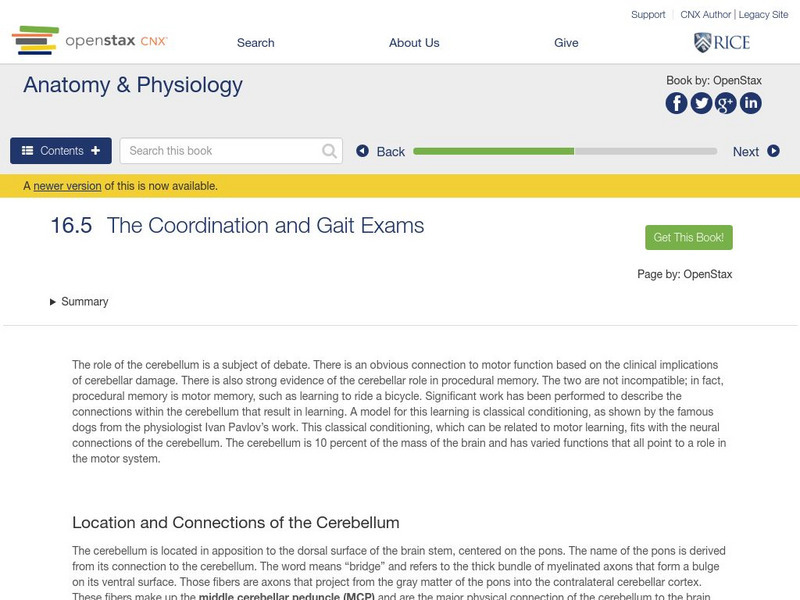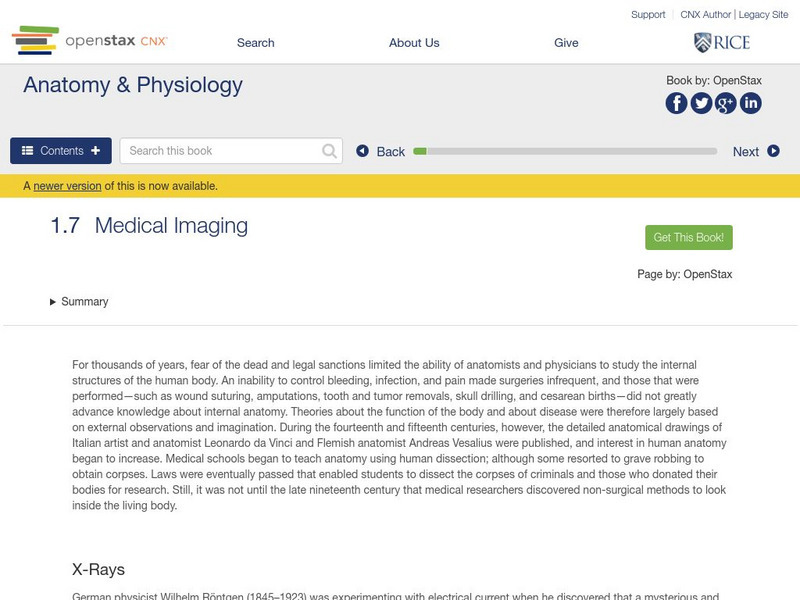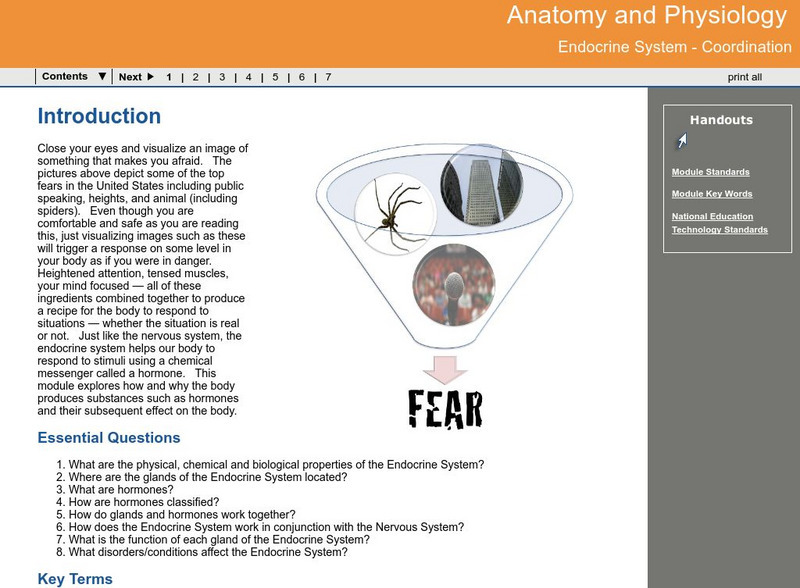OpenStax
Open Stax: Anatomy & Physiology: Physical Characteristics of Urine
Students learn the chemical make-up and pH of urine in the human body.
OpenStax
Open Stax: Anatomy & Physiology: Maternal Changes During Pregnancy and Birth
Students learn about the changes that happen in a woman's body during pregnancy, labor, and delivery of a baby.
OpenStax
Open Stax: Anatomy & Physiology: Lactation
Students learn about the structure of the lactating breast, and summarize the process of lactation.
OpenStax
Open Stax: Anatomy & Physiology: Patterns of Inheritance
Students learn about patterns of inheritance including genotype and phenotype, and then learn about the inheritance of autosomal dominant and recessive and sex-linked genetic disorders.
OpenStax
Open Stax: Anatomy & Physiology: The Sensory and Motor Exams
Students learn the arrangement of sensory and motor regions in the spinal cord in order to understand a sensory and motor exam. They will also understand the clinical indications of common reflexes.
OpenStax
Open Stax: Anatomy & Physiology: The Pituitary Gland and Hypothalamus
Learn about the hormones released by the pituitary gland, their target cells, and their principal actions, as well as the structure and function of the hypothalamus.
OpenStax
Open Stax: Anatomy & Physiology: The Pineal Gland
Students learn about the location, structure and function of the pineal gland as well as the hormones produced there.
OpenStax
Open Stax: Anatomy & Physiology: Nervous System Control of Muscle Tension
The following site provides information regarding the nervous system's control of muscle tension.
OpenStax
Open Stax: Anatomy & Physiology: The Mental Status Exam
Students understand the relationship of mental status exam results to cerebral functions in the cerebral cortex.
OpenStax
Open Stax: Anatomy & Physiology: The Endocrine Pancreas
Students learn about the location and structure of the pancreas, and the morphology and function of the pancreatic islets.
OpenStax
Open Stax: Anatomy & Physiology: The Cranial Nerve Exam
Students learn about the functional grouping of cranial nerves and match the regions of the forebrain and brain stem that are connected to each cranial nerve.
OpenStax
Open Stax: Anatomy & Physiology: The Coordination and Gait Exams
Students learn about the relationship between the location of the cerebellum and its function in movement in order to understand the processes of coordination and gait exams.
OpenStax
Open Stax: Anatomy & Physiology: Overview of the Neurological Exam
Find out about the major sections of the neurological exam and the connection between location and function in the nervous system. Also learn the benefit of a rapid assessment for neurological function in a clinical setting.
OpenStax
Open Stax: Anatomy & Physiology: Leukocytes and Platelets
This study of white blood cells includes informational reading material, illustrated diagrams, vocabulary, and self-checking review and application questions.
OpenStax
Open Stax: Anatomy & Physiology: The Parathyroid Glands
Students learn about the location and structure of the parathyroid glands and find out what happens to the body when these glands fail to function.
OpenStax
Open Stax: Anatomy & Physiology: Medical Imaging
Learn here all about medical imaging, non-surgical methods to look inside the living human body.
OpenStax
Open Stax: Anatomy & Physiology: Water Balance
Learn how water levels in the body influence the thirst cycle and body fluid regulation. Find out about dehydration and identify common causes of dehydration.
OpenStax
Open Stax: Anatomy and Physiology: The Function of Nervous Tissue
Learn here about how nervous tissue is capable of communicating within the nervous system.
OpenStax
Open Stax: Anatomy & Physiology: Body Fluids and Fluid Compartments
Learn about the chemical and physical characteristics of the fluids that make up the human body.
Other
Get Body Smart: Urinary System: Anatomy and Physiology
This innovative resource investigates the kidneys. Topics include the external and internal anatomy of the kidneys, histology of the cortex region, and histology of the medulla region.
Georgia Department of Education
Ga Virtual Learning: Anatomy and Physiology: Endocrine System
Through informational text, video clips, practice problems, and external assignments, students discover the structure and function of the endocrine system of the human body.
Georgia Department of Education
Ga Virtual Learning: Anatomy and Physiology: Cardiopulmonary Sys Transportation
Through informational text along with printable notes, animations, video clips, and practice problems, students discover how the structures of the cardiovascular and respiratory systems work together and function as one. Provides lots of...
Georgia Department of Education
Ga Virtual Learning: Anatomy and Physiology: Skeletal System Support
Through informational text, interactive activities, practice problems, and video clips, students complete this learning module on the human skeletal system.
Georgia Department of Education
Ga Virtual Learning: Anatomy & Physiology: Digestion Sys Absorption, Elimination
Through informational text with printable notes, interactive assignments, and video clips, students discover the structure and function of the human digestive system.
Other popular searches
- Heart Anatomy and Physiology
- Anatomy and Physiology Web
- Plant Anatomy and Physiology
- Brain Anatomy & Physiology
- Basic Anatomy and Physiology
- Heart Anatomy Physiology
- Muscle Anatomy & Physiology
- Anatomy & Physiology 1
- Anatomy Physiology Digestion
- Anatomy & Physiology Models
- Anatomy Physiology Digestive
- Anatomy Physiology Wolf


